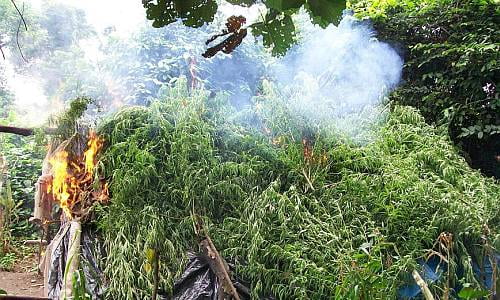The Cannabis Africana: Drugs and Development in Africa project was officially launched on 7 June 2022, at 3PM UK Time. A lot of people had expressed interest to attend the launch, and many did manage to join the online event. As project members, we are grateful for the support we received from colleagues. You can find the link for the video here.
We also appreciate the input we received. It assist us as we move towards conducting fieldwork for the project. Very important questions and/or contributions were made by the guests. For instance, we were encouraged to make sure that we have an overall project objective so that we do not run four independent projects within what should be a single project with four case studies – South Africa, Zimbabwe, Kenya and Nigeria. For a project such as this, there is a risk that each case study may focus on different issues which can make it difficult for us to have common themes. In addition, we have to make choices on what can feasibly be investigated within our timeframe. This comment is important and welcome.
The comment above points to the need for us to conceptualise the relationship between drugs/cannabis and development. Part of that centres on what we mean by drugs and development. We are aware of the importance of undertaking this exercise because it allows us to tie together the various project objectives shown below:
- To provide an historical account of cannabis in sub-Saharan Africa;
2. To understand the contemporary place, purpose and perceived utility of cannabis;
3. To explore the varied cultures of consumption that are arranged around cannabis; and,
4. To assess the impact of drug policy on cannabis production, distribution and use in 4 sub-Saharan countries.
We take the view that concepts such a drugs and development are contested, and carry varied meanings. Development, for instance, has contextual meanings, and we seek to unravel such varied meanings in the course of our study. Further, development may be understood from various angles, be it culture, social, political and economic. This informs the broad nature of our objectives. It is in this context that an attempt to frame the study, conceptually, is a key exercise.
The above links to another comment raised on language and meanings and perceptions that arise following usage of certain concepts. An example given was the applicability of the word ‘drugs’ on cannabis as an economic activity. What perceptions does the word ‘drug’ stimulate in people’s minds. When something is labelled a drug how do we respond to it, or the people undertaking such activities. This is an important question, as it force us to think deep on the power and limits of language, and how they influence our positions. How do we explain the fact that community members openly mobilise local labour to harvest cannabis, a crop that we expect the majority to view as a harmful drug? This suggests that the community may have a different relational existence to cannabis that we do not understand. It would be interesting to find out if community members refer to cannabis as a ‘drug’, and the different languages used in reference to it.
These are some of the issues you will be confronted with as you go through the video recording. And we welcome comments and any input you may want to give us after viewing the video.

I agree that communities have different perceptions of the the term “drug” particularly when used to describe Cannabis whose use has been under barn in most African countries. It will be `indeed difficult to convince such communities on positive effects the “drug” can have.